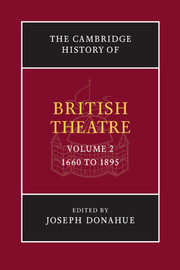Book contents
- Frontmatter
- Part I 1660 to 1800
- Part II 1800 to 1895
- 11 Introduction: the theatre from 1800 to 1895
- 12 Presence, personality and physicality: actors and their repertoires, 1776–1895
- 13 Theatres, their architecture and their audiences
- 14 Stage design from Loutherbourg to Poel
- 15 Theatre and mid-Victorian society, 1851–1870
- 16 Gendering Victorian theatre
- 17 Popular entertainment, 1776–1895
- 18 The Bells: a case study A ‘bare-ribbed skeleton’ in a chest
- 19 The new drama and the old theatre
- 20 1895 A critical year in perspective
- Bibliography
- Index
- References
18 - The Bells: a case study A ‘bare-ribbed skeleton’ in a chest
from Part II - 1800 to 1895
Published online by Cambridge University Press: 28 March 2008
- Frontmatter
- Part I 1660 to 1800
- Part II 1800 to 1895
- 11 Introduction: the theatre from 1800 to 1895
- 12 Presence, personality and physicality: actors and their repertoires, 1776–1895
- 13 Theatres, their architecture and their audiences
- 14 Stage design from Loutherbourg to Poel
- 15 Theatre and mid-Victorian society, 1851–1870
- 16 Gendering Victorian theatre
- 17 Popular entertainment, 1776–1895
- 18 The Bells: a case study A ‘bare-ribbed skeleton’ in a chest
- 19 The new drama and the old theatre
- 20 1895 A critical year in perspective
- Bibliography
- Index
- References
Summary
That a play of no great merit, carried almost entirely by one actor in the leading role, should have a chapter to itself in what is otherwise a broad examination of the nineteenth-century stage is not altogether remarkable. The Bells invites consideration as a stand-alone ‘exhibit’ or ‘case study’ because it is one of the few nineteenth-century plays where so many elements of its production and reception by the public in Britain and abroad survive. In addition, this play is an index to the career of a remarkable actor. The Bells was a play in which Henry Irving, its leading actor, passed in the space of a few days from comparative obscurity to celebrity and fame, enabling him to establish himself as Britain’s leading interpreter of serious and classical roles. Beginning with the role of Mathias, Irving became known as an actor in possession of a singular gift for enacting characters, intellectually superior and somewhat aloof, who are secretly tormented by suppurating guilt for hideous hidden crimes, by anguish, regret and remorse. In his lifetime and for years beyond, Irving’s performance in The Bells was so well known that his voice and mannerisms were imitated by numerous variety artistes.
Between 1871 and 1905 The Bells was seen by audiences in Britain and North America, receiving critical reviews by a range of British, American and Canadian journalists. Their press notices, supplemented by eye-witness accounts from a range of spectators, provide valuable insights into the drama’s appearance on the stage and offer valuable information about Irving’s approach to his role and its popular and critical reception.
- Type
- Chapter
- Information
- The Cambridge History of British Theatre , pp. 388 - 404Publisher: Cambridge University PressPrint publication year: 2004
References
- 1
- Cited by



